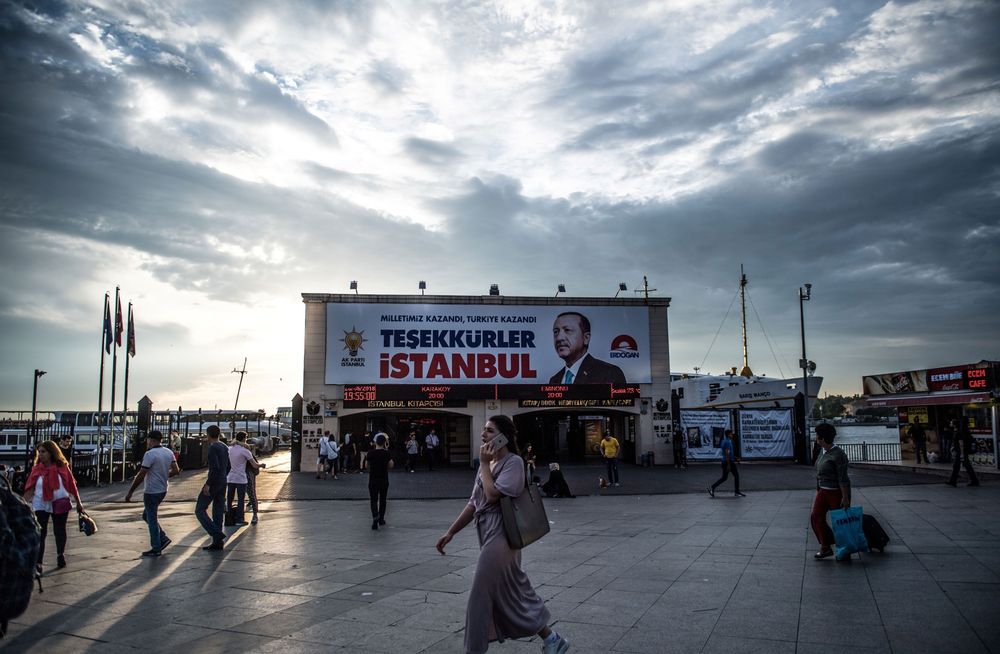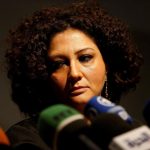Recep Tayyip Erdogan on Feb. 24. Photographer: Murat Kula/Anadolu Agency/Getty Images
By Selcan Hacaoglu and Firat Kozok
Soon after the last kick of the game, the fists and curses started to fly.
It began as the kind of soccer violence so common in Turkey, when players from the home team of Antalya began throwing punches at visiting players from the Kurdish-dominated southeast. Yet once the home fans joined the fray, shouting slurs at the rival team, the ethnic tensions menacing next month’s municipal elections were laid bare.
The fighting kept up until armored police cars arrived to evacuate players, some of them bloodied and bruised, according to video clips from Cizrespor, the away team, posted on social media and pro-Kurdish websites. The atmosphere was already loaded before the match turned violent, with nationalist songs blaring from loudspeakers as a Turkish flag covered the scoreboard, the team said. Screaming Antalya fans likened Cizrespor to Kurdish separatists the Turkish military has been fighting for decades.
While Turkish soccer matches can be notoriously violent, there had never been bad blood with the home club in the Mediterranean town of Antalya, which most recently voted for Recep Tayyip Erdogan’s ruling AK Party. But with the party liable to lose some municipalities including Antalya in the March 31 elections, the game showed how easily festering ethnic tensions could turn an otherwise insignificant 1-1 draw between third-division teams into a violent free-for-all.
Stoking the friction is the pro-Kurdish HDP party’s decision to sit out crucial municipal races outside its southeast stronghold. Instead, it will support candidates from the opposition bloc led by the secular CHP, hoping to send enough votes its way to capture some of Turkey’s biggest cities.
Economic Discontent
Dissatisfaction with the economy may hurt the ruling party in some large cities, particularly after a steep fall from China-like levels of growth. The lira crashed over the summer, and inflation is still hovering above 20 percent. Forecasts compiled by Bloomberg show the Turkish economy on track to shrink for three quarters in a row through June 2019.
But Erdogan’s base may hold strong, in part due to his appeal to nationalist sentiments.
“It is very difficult to solve the problems that we’re experiencing in the economy today, and I don’t think they can be solved for a very long time,” said 49-year-old Riza Gurleyen. “No one else can solve them except the government of Erdogan and if they can’t we are all in trouble.’
Rare Move
It’s unusual for forces in Turkey’s fragmented opposition to come together in this way, but the stakes at next month’s polls — the first since Erdogan assumed vastly expanded powers last year — are unusually high. The loss of key cities such as Istanbul and Ankara, while in no way assured, would hand a stinging defeat to Erdogan in an election widely seen as a barometer of his popularity since the controversial changes.
Victory would also help avenge a crackdown on HDP loyalists that has seen Kurdish leaders jailed on allegations of terrorism or forced out of elected office.
At least three polls suggest the opposition bloc is leading the race in the Turkish capital, Ankara. Former premier Binali Yildirim of the ruling party is seen stronger in Istanbul.

Recep Tayyip Erdogan on Feb. 24. Photographer: Murat Kula/Anadolu Agency/Getty Images
Erdogan — himself a former mayor of Istanbul — is trying to reprise his successful strategy in 2018 elections, when he allied with a nationalist party to emerge victorious despite a deteriorating economy. At election rallies, he paints Kurdish aspirations for self-rule as the biggest threat to the country’s integrity.
“Is there a region called Kurdistan in Turkey?” Erdogan asked at a Feb. 24 election rally in his central Anatolia power base. Projected on large screens behind him was archival footage of a promise by jailed HDP leader Selahattin Demirtas to erect a statue of imprisoned Kurdish rebel leader Abdullah Ocalan and remarks by another jailed Kurdish lawmaker saying fighters know how to aim their Kalashnikov assault rifles against pro-government forces if needed.
Pivotal Victory
Erdogan’s rhetoric against Kurdish politicians has grown increasingly harsh since a nascent peace process with the autonomy-seeking Kurdistan Workers’ Party, or PKK, was derailed by an inconclusive national election in June 2015. That ballot brought the HDP into parliament for the first time, ending AKP’s 13 years of single-party rule. A repeat poll six months later restored the party’s parliamentary majority but also prompted the renewal of clashes.
At the same time, the president has acted to strangle the party politically, jailing hundreds of Kurdish politicians and seizing about 100 municipalities in the southeast where elected mayors have been ousted for alleged ties to the Kurdish militant group.

Sezai Temelli Photographer: Chris McGrath/Getty Images
In the March poll, HDP is expected to sweep the largely Kurdish southeast. Its jailed leader, Demirtas, has urged Kurdish voters in the west to cast their ballots “strategically” to push back the ruling party and its nationalist ally.
“We will win in Kurdistan,” said Sezai Temelli, co-chairman of the HDP, using an outlawed reference to the country’s largely Kurdish southeastern region. “And in the west, we will make AKP” and its nationalist partner lose, Temelli said.
Municipal Seats
Officially, the opposition alliance is composed of the pro-secular CHP and the nationalist Iyi Party, and officials of both are careful to avoid reference to their collaboration with the HDP for fear of alienating nationalists. Supporters of a small Islamist party, Saadet, are also backing some CHP candidates.
In return for its support, the HDP is asking for more seats on municipal councils, according to two opposition officials who are familiar with the negotiations. While the extent of the cooperation with the HDP remains unclear, nationalists in several Mediterranean provinces with sizable Kurdish populations “are disturbed by the rumors that HDP will support CHP candidates there,” according to Murat Gezici, head of the Gezici polling company.
The three opposition parties agree that they are compelled to join forces if they are to have any chance of curtailing Erdogan’s political influence, according to the two officials.
“If these people declare their support for some parties without formally entering an alliance, are we going to say ‘no, don’t vote for us?” asked Aytun Ciray, deputy chairman of the nationalist Iyi party.
Source: Bloomberg



